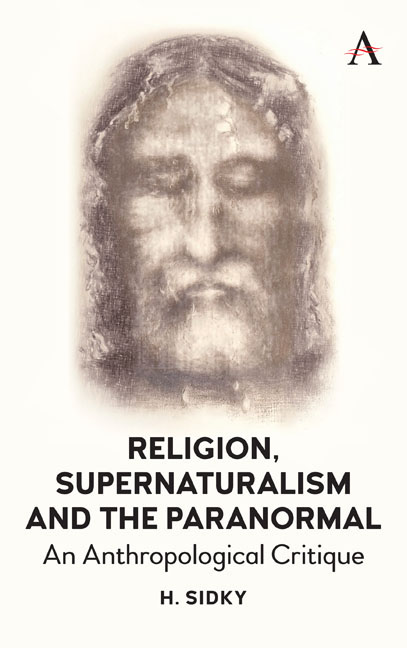Book contents
- Frontmatter
- Dedication
- Contents
- Acknowledgments
- Introduction
- Chapter One The Problem with Religion: Preliminary Issues
- Chapter Two The Unreal Real: The Supernatural, Religion, and the Paranormal
- Chapter Three Can Science Say Anything About Religion and the Supernatural?
- Chapter Four Ghostly Rappings, the Science of the Soul, and the Religious Nature of the Paranormal
- Chapter Five Ghostly Encounters in the Field: Anthropology of the Paranormal or Paranormal Anthropology?
- Chapter Six Why We Think the World Is Haunted
- Chapter Seven Cognitive Biases and Why People Think Eerie Thoughts
- Chapter Eight Miracles as Evidence of God's Actions in the World
- Chapter Nine When God Talks to People: Are Religious Experience Evidence of God?
- Chapter Ten Books Authored by God? Sacred Texts as Evidence of the Supernatural
- Chapter Eleven God's Fingerprints in the Natural World: Intelligent Design, Irreducible Complexity, and Cosmic Fine-Tuning
- Chapter Twelve The Miracles of the Bible: The Quintessential Foundations of Paranormal Beliefs in Western Culture
- Chapter Thirteen Jesus the Miracle Worker, Magician, and Sorcerer
- Chapter Fourteen Jesus's Empty Tomb, Missing Body, and Return from The Dead: Sources for the Paranormal Tale
- Chapter Fifteen The Post-Resurrection Appearances in the New Testament
- Chapter Sixteen Coping with Failed Prophesy: A Socio-Psychological Explanation for the Rise of Christianity
- Chapter Seventeen Conclusions: Why Religious and Paranormal Beliefs Persist and Their Dangers
- References
- Index
Chapter Four - Ghostly Rappings, the Science of the Soul, and the Religious Nature of the Paranormal
Published online by Cambridge University Press: 16 December 2019
- Frontmatter
- Dedication
- Contents
- Acknowledgments
- Introduction
- Chapter One The Problem with Religion: Preliminary Issues
- Chapter Two The Unreal Real: The Supernatural, Religion, and the Paranormal
- Chapter Three Can Science Say Anything About Religion and the Supernatural?
- Chapter Four Ghostly Rappings, the Science of the Soul, and the Religious Nature of the Paranormal
- Chapter Five Ghostly Encounters in the Field: Anthropology of the Paranormal or Paranormal Anthropology?
- Chapter Six Why We Think the World Is Haunted
- Chapter Seven Cognitive Biases and Why People Think Eerie Thoughts
- Chapter Eight Miracles as Evidence of God's Actions in the World
- Chapter Nine When God Talks to People: Are Religious Experience Evidence of God?
- Chapter Ten Books Authored by God? Sacred Texts as Evidence of the Supernatural
- Chapter Eleven God's Fingerprints in the Natural World: Intelligent Design, Irreducible Complexity, and Cosmic Fine-Tuning
- Chapter Twelve The Miracles of the Bible: The Quintessential Foundations of Paranormal Beliefs in Western Culture
- Chapter Thirteen Jesus the Miracle Worker, Magician, and Sorcerer
- Chapter Fourteen Jesus's Empty Tomb, Missing Body, and Return from The Dead: Sources for the Paranormal Tale
- Chapter Fifteen The Post-Resurrection Appearances in the New Testament
- Chapter Sixteen Coping with Failed Prophesy: A Socio-Psychological Explanation for the Rise of Christianity
- Chapter Seventeen Conclusions: Why Religious and Paranormal Beliefs Persist and Their Dangers
- References
- Index
Summary
But the work in parapsychology does more than refute materialism. It is more, too, than a new method of solving problems. There are, at least, still other definite implications and possibilities. Since this new science has penetrated the physical barrier that has hidden man's true nature from the scientists of the past, it has literally become the science of the spiritual aspect of nature.
— Joseph Banks Rhine, New World of the Mind (1953)Parapsychological investigations tend to undermine [the] “physicalist” view of the world and, thus, to remove one of the obstacles to religious belief […]. Parapsychological research seems to reveal a world in which it is more reasonable to suppose that God and the supernatural play a part.
— Robert Thouless, “Implications for Religious Studies” (1977)Often our brains can mislead us, and can lead us to believe that we have had a paranormal experience even when no such thing has happened. Indeed, even if there is no such thing as a paranormal phenomenon, human information processing works in such a way that we are all likely from time to time to have experiences that seem for all the world to be paranormal.
— James Alcock, Parapsychology as a “Spiritual Science” (1985)Not only have [parapsychologists] failed to discover significant new facts, but by nagging away at the few facts they thought were already in the bag, they have slowly but surely taken away the credibility even from those.
— Nicholas Humphrey, Leaps of Faith (1999)The term “paranormal” was adopted by researchers during the first half of the twentieth century to define the subject matter of the emergent field of parapsychology (Thouless 1942). Parapsychology represents the continuation of the scientific search for ghosts, spirits, and the soul that started in 1882 with the formation of the Society for Psychical Research (SPR) in Britain. The counterpart of this organization was the American Society for Psychical Research (ASPR), established in the United States in 1884 (Beloff 1977: 4– 16; Kurtz 1985b: 192– 209).
- Type
- Chapter
- Information
- Religion, Supernaturalism, the Paranormal and PseudoscienceAn Anthropological Critique, pp. 93 - 110Publisher: Anthem PressPrint publication year: 2019



